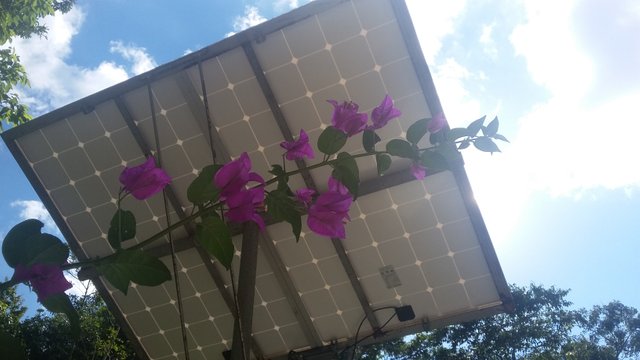
My wife and I have been off grid in the jungles of Mexico for almost 6 years now. We've learned a plethora of knowledge, many times the hard way. We went from nothing more than glorified camping to being able to thrive without what most people take for grant. When someone says they're off the grid, many people imagine a person living in a cave disconnected from society. In reality, it simply means we generate our own power, provide most of our own water and handle our own waste.
I spent many nights reading about off the grid living by people in different regions that didn't really relate much to us. Most people who write books about going off the grid do so some place cold and up north. Logically, most of their suggestions relate to not freezing to death during the winter. Since we planned move near Tulum, an area that doesn't get below 60 degree F, most of the information was wasted on us.
I'd been visiting the area of Mexico we planned to move for 25 years. I felt like I knew the place, it all seemed like paradise. What I really knew what a resort like setting, well manicured and beautified for the tourists eye. Moving to the jungle showed me the reality of environment. It was hot, brutal and unforgiving. The first trek into the jungle to scope out our land, I broke my foot. Not a great start to a off the grid lifestyle.
I'm not mountain man nor do I claim to be any type of survivalist. I'm simply a person who loves to obtain knowledge that can be applied to the real world. My wonderful wife is motivated do'er. To me, she seems like an endless fountain of energy. Together we make a team and theres been many times we had problems and the moral support of a team mate was more important than any gizmo or gadget on the market.
No Facebook group I joined was there to prepare us for what came next. We bumbled along every step of the way but we, with help from family and friends, found life we can be happy with. I plan to write future posts going into more detail and even explaining how you can generate a living.
- 1 Power
We went the first two years living in the jungle without any real source of constant power. We had batteries, but we had no way to efficiently charge them. Initially we only had a gas powered generator, but even when new, it was too loud and consumed too much gasoline to be used on a regular basis. After a few years, we finally upgraded our system to also include solar. We started with a simple 2 panel, 500 watt setup. With our abundance of tall trees in the jungle and sub par Chinese rip off solar control system, we limped along with only having a single fan and the ability to charge cell phones. Within the last 2 years, we finally obtained a second pair of panels, quality power control and beefy inverter. Our current battery setup, being woefully undersized from the start, has been cycled past 50% for several years. Lucky for my family, the battery bank gave up its electrical ghost the day before the cool front from rolled in Mid November, so the need for fan at night is not an issue.
Lessons Learned
If you plan to go off grid, no matter in the jungle, mountains, country, etc, make sure to get YOURSELF adjusted while you have the ability to flip the power back on. Going cold turkey on power is fantasied by many eager to jump off grid, but the reality most of us are tied to some form of device that needs power. Many people I've spoken to who aspire to go off the grid are not mega rich with endless savings, but they have big dreams to live free of the ever costly rat race. Unless you have a large kitty fund (savings), you might find getting on to your plot of paradise might mean you don't get all the immediate luxuries.
When it comes to deciding how much solar you need, what you need to do is factor the power requirements of the items/devices you plan to use. There are online calculators for this type of thing, but devices can range in power usage, its best you determine your needs based off what you currently own (your Laptop, fridge, etc). My suggestion is purchase a device that will tell you the power requirements plugged into it and chart your needs accordingly. Here is device on Amazon that will assist you in doing this.
If you're building your house, you can get extra power savings from installing LED lights for your house (these can be VERY costly) or you can check out several DIY videos on youtube to build your own LED light fixtures with only needing the basic of soldering skills and parts you can find at your local Radio Shack.
The amount of energy produced each day must be enough to run your system but also charge the batteries with excess to spare. Y The name of the game with batteries is don't allow them to drop below 50% if you want to prolong their life. The average life of a battery bank that is drained each night and recharged each day is around 2 years.
DON'T mix and match batteries. Even if you buy the same brand/type/style of battery as what is part of your system, adding a new battery to a old bank or older battery to a bank of new batteries will cause faster degradation of the batteries. The solar controller will get funky voltage readings and some batteries will be over charged while others will not get full. When you buy batteries, buy them all at once. DON'T use car batteries. They're not designed to be discharged and recharged often.
DO If you're in the US, I would highly consider purchasing a Tesla battery bank. Putting your money into a good battery bank is one of the bests investments you can do, especially a person on a budget. Here is a video by Will Prowse of RV living and off-grid solar that explains exactly why one should go with a Tesla lithium battery vs other types.
Before you spend money buying systems (solar, wind, water) you hope will work to generate you electricity, investigate if your location you plan to go off the grid will provide for it. I purchased a wind generator with high hopes of getting free power since we live kinda close to the beach. With how far we are into the jungle and the height we would need to reach to get the generator over the trees, it would never work for our situation.
- 2 Sewage
Depending on your location, dealing with human waste can be a struggle and strolling off into the woods to dig a hole gets real old real fast, esp late at night. In our area of Mexico, our ground is mostly rocks, making traditional septic tanks a possible hazard to the existing water system below and in many cases, it requires service to empty it which isn't the best if you want be left alone.
Lessons Learned
There are a ton of different ways to handle poop. My desire was to be as hands off as possible, so that eliminated choices like composting toilets, chemical toilets, bags or septic tanks. We went with a biodigestor tank. This type of system works with heat from the sun and bacteria to break the waste down enough to be discharged on the ground without fear of it contaminating the ground water. The brand of biodigestor we purchased is by a company called Rotoplas. They make a quality product and if you're in Mexico, I suggest looking into their product.
Another system I personally really like is the solar toilet. This system uses a solar oven to evaporate all the moisture from the waste. Human waste is 95% water, so when its dried out, its basically a fine dust. Since the solar oven can get pretty hot, it will burn off any harmful bacteria or microbes, making the powder harmless and fine to apply directly to plants. This system, even used often, will only need to be emptied every 3-5 years and its less than a cubic foot of material with no smell. Below is a picture I drew in MS Paint showing how it would look.
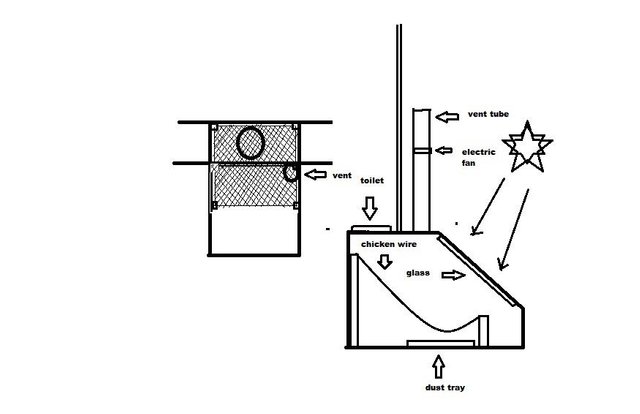
- 3 Water
The human body can go weeks without food, but only a couple of days without water. The best thing a person can do when going off the grid is initially secure a source of water. Without a means to obtain water on site, you will be forced to bring water in from another location which can become costly as the price of gas keeps going up.
Lessons Learned
For most people, getting a well dug is the best option for getting water to do construction (mixing any concrete, etc) and a source of water that can be filtered. The acronym KISS, Keep It Simple Stupid is the best way to think of dealing with off the grid solutions. We currently have a in well water pump that requires electricity. This has worked very well for many years and allows us to fill a 500L water tank when hooked up to our solar system. When days are cloudy, we have to budget the existing water. With how high in solids and calcium specifically, its only a matter of time before the pump has issues and will require being disassembled and/or replaced. A secondary manual hand pump with replacement gaskets and o-rings would be a great solution if storms or failure. Another option is setting up systems to collect rain. Rain barrels are smart solutions for obtaining water for plants in areas that the ground water isn't suited for farming.
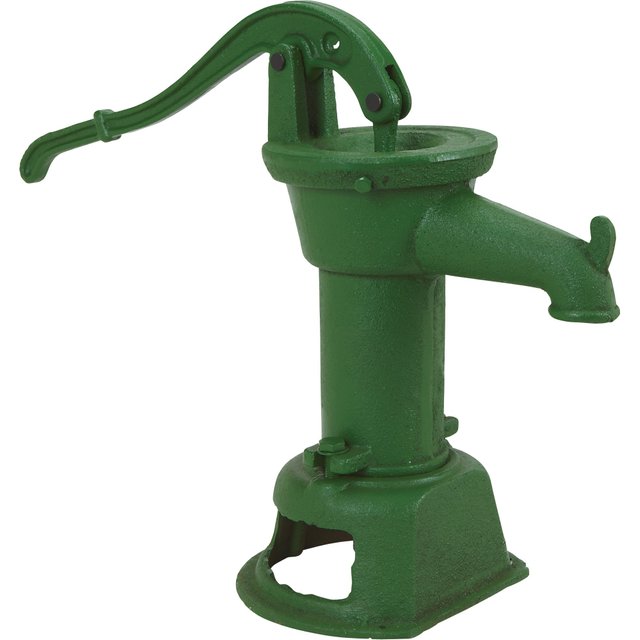
Another thing a person looking to go off the grid will need is a means to filter water to make it drinkable. There are many high quality water filter systems on the market like Berkey that you can easily clean and recharge the filters. Other options are systems based around activated charcoal, sand and gravel. These systems will do a great job filtering but its always advised to boil your water. In Mexico there is a system in place to provide cheap bottled water so we still rely on that method mainly simply for convenience. Here are two videos on making your own types of water filters. I really love reusing items and buckets are one of my favorite items around the homestead.
- 4 Cooking
For most people, cooking is just a basic chore we do to survive. When living off the grid, cooking can be the cause of many sources of stress be it, heat, pests, etc. Depending on your power system, many people like us have excess day time power, which allows us the ability to use an electric slow cooker. Other options are propane tanks, but propane where we live has steady increased in cost over the years and to refill the tank is over 2 hours. Another issue with cooking is the problem with the building you cook in heating up, taking hours for the heat to dissipate.
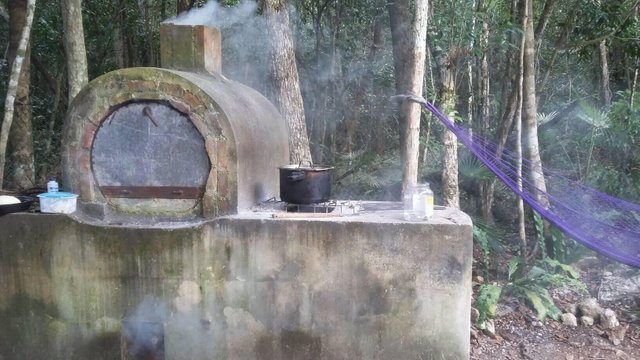
Lessons Learned
Early on I was a big fan of rocket stove and rocket ovens. These types of cooking devices allowed for mostly smokeless wood fires that could get really hot with limited fuel. Before our house was finished, I had designed and had our stove and oven built. We used a 55 gallon barrel that heat flows around, allowing for equal heating without smoke touching the food, which is great for breads and pastries. We used only the rocket stove for several years before we upgrade to a propane setup once our daughter was born. Cooking outside keeps the heat out of the main house which mean less effort to keep it cool. We can throw a large pile of wet leaves into the stove if we want to smoke out the area around the house to keep bugs away which is also very helpful.
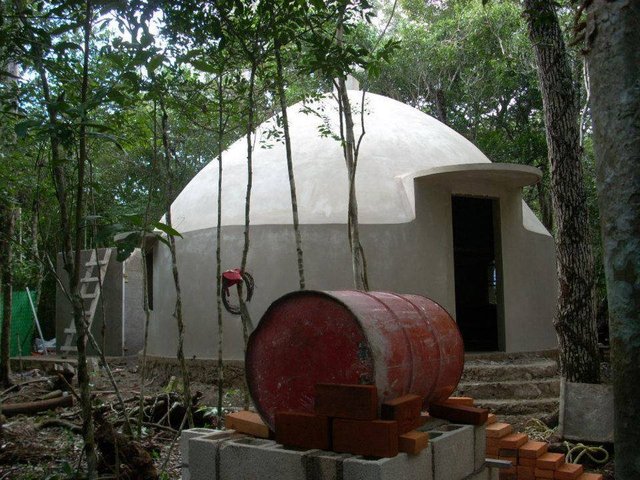
- 5 Growing Food
Growing food is like playing golf, its easy to do it but hard to perfect it. Depending on your location, special tricks may be required for you even to see a small yield from your crops. Many things you need consider is quality of the soil your area has, the type of pests you might contend with (insects, deer, bunnies, etc) and quality of water you can easily obtain. Other factors is weather changes, available sun if you're an area with tree coverage and possible flooding areas.
Lessons Learned
When it comes to our area of Mexico near Tulum, the environment is not really fit for growing without major effort. We tip our hats to those farmers in our area that can consistently produce quality yields while battling the bugs and beasts of the jungle. We find, even with constant tending, we are attacked by MONSTER grasshoppers each year. When the grasshoppers are not eating everything, the iguanas and even MONKEYS will come eat. Our soil and water are both only fit to grow a select few types of fruit trees and veggies and we've taken to collecting rain water for most of our plants. Doing raised better with quality soil and enclosing in a screened room or green house is really the only solution to growing a crop with a somewhat predictable yield. It really sucks to watch a plant grow big and strong and wait for it to put on veggies just to wake up one morning and see that caterpillars have eaten everything.
Get a compost pile started and you will sooner or later have quality soil. Keeping animals like ducks and chickens are a good way to protect your gardens and you can use their poop as compost once its not hot.
- 6 Food Storage
When you live in a conventional house with abundant amount of easily accessible power, its easy to store perishable food in refrigeration or at very least, in a climate controlled area. This isn't always the case for people off the grid. For people in tropical climates, we have medium high heat and high humidity all year round. Keeping fresh fruits and veggies without refrigeration is a serious challenge and even storing dry goods for more than a few month not likely possibly without extreme steps taken.
Lessons Learned
If you have the ability to purchase jars for canning, its always worth buying fruits and veggies in bulk from a local farmers market and spend the weekend processing all of it. My wife and I, when we lived in Texas, would jar foods and store them. Problem is here in Mexico, a single jar can cost 5 dollars. With a year round growing season, its nice to have a small little community 30 mins away that has a little veggie stand we visit once a week when times are good. The produce is brought from local farmers only a few miles away. I've learned to make beef jerky and smoked meats, which help prolong the meats shelf life. We've simply adopted a mostly meat free diet and usually have a meal with meat once, maybe twice a week. Having a root cellar under ground is a great option for electric free food storage solutions. Use of Pop-It containers has helped a ton to cut down on humidity contamination, but the containers can become costly if you plan to store any large amount of food and its no guarantee it still won't go bad. If you have a mild climate, you can leave many fruits and veggies out on the counter, just study which veggies might create gasses that cause other fruits or veggies to ripen faster. If you raise chickens or ducks, make sure to not wash the eggs. In a mild to warm climate, you can store eggs on the counter for several months before they will go bad. Other options for storing eggs is called glassing eggs. Glassing eggs will allow you to store eggs for almost a full year without any issue.
- 7 Laundry
You work hard, you play hard and at the end of the day what do you have? A pile of dirty clothes. When you're counting every watt of power your panels can generate, running a washing machine is easily out of the question for most people eager for the desire of freedom. Humans have washed by hand for thousands of years and luckily technology and techniques for even manual clothes washing has improved greatly.
Lessons Learned
One thing we found out quickly was hand washing and line drying clothes really wore them out. I purchased a sink locally made of concrete with a washboard texture. Again, we found this was entirely too rough for our clothes. Add in our very hard water and extreme sun during most of the year and we were purchasing new clothes quickly. My wife switched to using a large tub filled with water, soap and clothes and did the stomping method. This method has provided her some great legs, but also clean clothes with substantially less wear. Other options are plunger washers. Its basically nothing more than a toilet plunger with holes/flaps inserted that allows you to wash your clothes inside a 5 gallon bucket. These work well and I highly recommend them if its just or you and someone else. This method isn't really the best option with a large or growing family. Here is a awesome bucket based video on how you can make your own!
- 8 Storage
Before my wife and I went off grid in the jungle, I went off grid for a while onboard a 27' sailboat. Moving to a small location helps you downsize. Down sizing is hard for those of use raised in a society where we purchase house and fill them with things. What you think you need and what you REALLY need could be two entirely different things. When going off the grid, most people read websites and articles with all sorts of endorsements for this or that magic device. They spend their nights, looking on Amazon at all the fun little gadgets. I've seen people spend all their money on gimmicky bull crap that when put up to daily usage, couldn't hold up to time tested techniques and tools. At the end of the day, less is more.
Lessons Learned
Keeping a bunch of things around for situations it may be useful isn't worth the effort. The humidity will destroy most items, metal things will rust and plastic will become brittle and crack due to heat. Paper will get damp and warped, books will dissolve away in front of your eyes. When it comes to letting go of your things, you honestly have to be real with yourself. When I first moved onto my boat, I believed my possessions made me... me. It was hard to part with the things I spent so long picking out.
If you have items that you really care about, the moisture absorbing crystals that are sold at most grocery and hardware stores work really well in conjunction with bins with seals or even pelican cases. My wife swears by that Tub Life, putting things in plastic bins with snap tight lids in hopes to prevent bugs from invading. If we find we own something and we haven't interacted with it in 8 months, we usually take a moment consider if its needed in the house. If it isn't super important, we donate it to local people who might be in need. Clutter attracts bugs. Bugs attract rodents. Rodents bring sickness. I know throwing away all the worldly possessions you don't use on a regular basis isn't the ideal solution to storage, but without pricey storage solutions like pelican cases, its easier to chunk than to slowly watch everything you own slowly fall into a path of degradation and just get chunked when covered with mold and causing asthma symptoms.
- 9 Housing
Many people dream of a quite little piece of land far away from the hustle and bustle. The sad reality for many in the US is no matter where you go, with the exception of few havens of freedom, you're at the mercy of building according to someone else's guidelines. It is paramount for those considering going off grid and being free of government intervention to really investigate possible choices and see what is required to build on your own property. Consider designs for your house that work off a modular design. Having a kitchen separate from the living or bedrooms keeps the area you sleep nice and cool. If at any point you obtain a excess of power and could afford a inverted low power air conditioning system, it will use less power cooling off a small individual room vs an entire house.
Lessons Learned
We built a monolithic concrete dome home. The house is pretty awesome, but we learned quickly that concrete will absorb heat and radiate that heat into the house after the sun has gone down. After several several years, I've investigated other options in building that would be cost effective, easy to use and will keep the house cool. I LOVE the AirCrete building method. Normal concrete is mixed with a gravel and water. With Aircrete, you mix a bag of concrete with a bunch of soap foam. The soap foam creates bubbles that insulates the concrete, which prevents heat from penetrating. a normal sized cinder block made with the aircrete method is even able to float in water. Its easy to work with, inexpensive and strong. Another thing to consider is building round houses. They're cheaper to build compared to square buildings, are more structurally sound and hurricane resistant. If you're in an area with plenty of usable soil, earthbag buildings are great if you have the work force to move a ton of dirt and pound it all flat.
- 10 Animals
So often I hear of people with rose colored off the grid glasses on, dreaming of having goats, a sheep, chickens and ducks, rabbits and even worms. What most won't talk about is the costs for what ends up being a glorified petting zoo. Animals can really add alot to to a homestead, including protection, food, manure and companionship, but they can be expensive, require daily attention and prevent you being able to leave your homestead without staying behind and tending the menagerie.
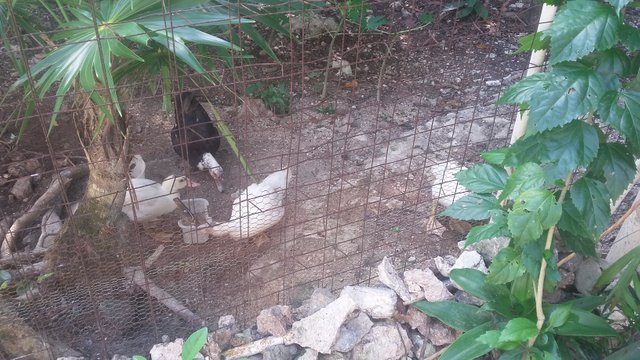
Lessons Learned
Unless you just want a bunch of pets and enjoy collecting mouths to feed, raising animals is a means to help supplement your source of food or income. You can love your animals, care for your animals, but at never forget if you feed them, sooner or later, they should be feeding you. Animal Husbandry is lucrative source of income to those with limited connection to the outside world. With the tech of today, one can easily arrange sales for a animals without anybody having to a travel one foot to facilitate the deal. Consider animals that you can feed with produce from your homestead. Nothing is worse than having to travel hours and limited fund to buy food for what will end up being your food.
I really hope you enjoyed my tips to getting started on going off the grid. I hope to write more articles in the future about other aspects of off the grid living including how to make a living $$$ off the grid. If you enjoyed my article, please follow and give it an upvote. THANKS!
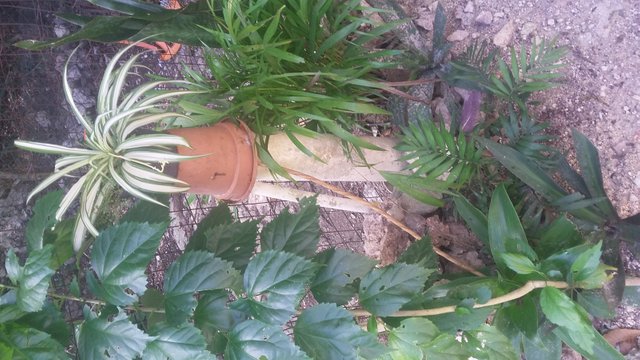
It's been fun to watch you figure this out over the last few years. You have answered many of my questions about solar and other off grid questions many times. Eventually I'll get that houseboat i always talk about and try to survive a couple winters to see how it goes.
Downvoting a post can decrease pending rewards and make it less visible. Common reasons:
Submit
This is a really well written post, I enjoyed reading it!
I'm one of those people who lives in a part of the world that is cold and cloudy for half the year, so reading about what you have to deal with in a hot climate is really interesting to me. Some of it is the opposite of what we deal with here. You need to cool your house, we need to heat ours.
Downvoting a post can decrease pending rewards and make it less visible. Common reasons:
Submit
Thanks sharing this first hand information.
Downvoting a post can decrease pending rewards and make it less visible. Common reasons:
Submit
My pleasure, glad you enjoyed it.
Downvoting a post can decrease pending rewards and make it less visible. Common reasons:
Submit
This post deserves a huge upvote from Curie! At least for the amount of information you shared in here! Many years ago I was tempted to go live off the grid somewhere in a country with a milder climate than Canada, but not as hot as the tropics as I knew that growing food was going to be a hassle.
My first idea was to go see Jacques' Fresco houses in the Venus project in Florida and see if it was something I could have done. Then I looked into earthships and lately the domes and the adobe houses. I read as much as I could on permaculture and whatever I could find on living off the grid, though I never took the step because somewhere in between moving to Ecuador my health went down the drain. Later on I found I had Lyme disease. I might have given up on being a pioneer due to my Lyme, but my heart still enjoys reading from others' experiences. Thank you for a wonderful post!
Downvoting a post can decrease pending rewards and make it less visible. Common reasons:
Submit
Thank you for supporting my post, it took me a while to compile the information and really hoped the time invested would be helpful to someone. The tropics makes it much easier than I would assume areas in Canada. I've always liked the idea of the Venus Project and we were very interested in earthships also. I hope to give you some more of our experiences off the grid and if you ever have any questions, please feel free to always contact me! Thank you again for such kind words and I wish you all the best!
Downvoting a post can decrease pending rewards and make it less visible. Common reasons:
Submit
Wow!
Nice article! And great points!
Downvoting a post can decrease pending rewards and make it less visible. Common reasons:
Submit
Thank you, I'm happy you enjoyed it! Love your profile name ;)
Downvoting a post can decrease pending rewards and make it less visible. Common reasons:
Submit
This is a most excellent post @volksdraggin thank you for sharing your lessons learned with us steemians. I'm looking to start my journey homesteading and living off grid. I really appreciate the information you presented here and what you will bring in the future!
Posted using Partiko Android
Downvoting a post can decrease pending rewards and make it less visible. Common reasons:
Submit
Thanks for the nice comment, I'm happy to know that some of my info might be helpful to you. I will post more stuff in the future on simple tricks of going off the grid and ways to generate a living while being so far away from normal hustle and bustle society. Have a great day!
Downvoting a post can decrease pending rewards and make it less visible. Common reasons:
Submit
Hey there, excellent article, thank you. I love Mexico, go there every year but I save my offgrid adventures for the houseboat on Arrrow Lakes in BC. We will actually be in Puerto Morelos for Christmas, not that far from you...hmm
Downvoting a post can decrease pending rewards and make it less visible. Common reasons:
Submit
Thanks for the nice comment! Puerto Morelos is really nice, let me know if you plan to head into Playa and maybe we can hang out. Take care and have a great day!
Downvoting a post can decrease pending rewards and make it less visible. Common reasons:
Submit
Congratulations! This post has been upvoted from the communal account, @minnowsupport, by Amberyooper from the Minnow Support Project. It's a witness project run by aggroed, ausbitbank, teamsteem, someguy123, neoxian, followbtcnews, and netuoso. The goal is to help Steemit grow by supporting Minnows. Please find us at the Peace, Abundance, and Liberty Network (PALnet) Discord Channel. It's a completely public and open space to all members of the Steemit community who voluntarily choose to be there.
If you would like to delegate to the Minnow Support Project you can do so by clicking on the following links: 50SP, 100SP, 250SP, 500SP, 1000SP, 5000SP.
Be sure to leave at least 50SP undelegated on your account.
Downvoting a post can decrease pending rewards and make it less visible. Common reasons:
Submit